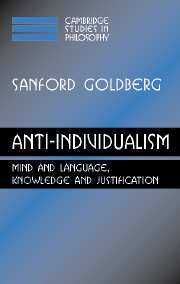Book contents
- Frontmatter
- Contents
- Preface
- Introduction
- Part I SEMANTIC ANTI-INDIVIDUALISM
- Part II EPISTEMIC ANTI-INDIVIDUALISM
- 5 The epistemic dimension of knowledge communication: towards an anti-individualistic approach
- 6 The objection from gullibility
- 7 The objection from rationality
- 8 Towards an ‘active’ epistemic anti-individualism
- References
- Index
7 - The objection from rationality
Published online by Cambridge University Press: 22 September 2009
- Frontmatter
- Contents
- Preface
- Introduction
- Part I SEMANTIC ANTI-INDIVIDUALISM
- Part II EPISTEMIC ANTI-INDIVIDUALISM
- 5 The epistemic dimension of knowledge communication: towards an anti-individualistic approach
- 6 The objection from gullibility
- 7 The objection from rationality
- 8 Towards an ‘active’ epistemic anti-individualism
- References
- Index
Summary
INTRODUCTION
In the previous two chapters I have defended three anti-individualistic theses regarding the epistemology of testimony. These were:
AI–K When S's belief that p is formed through testimony, whether S counts as knowing (as opposed to merely truly believing) p depends on facts regarding one (or more) of S's social peers;
AI–W When S's belief that p is formed through testimony, the warrant (= total truth-conducive support) enjoyed by S's belief that p depends on facts regarding one (or more) of S's social peers;
and
AI–J Whether S counts as justified in accepting a piece of testimony – as having the epistemic right or entitlement to accept the piece of testimony – depends on facts regarding one (or more) of S's social peers.
In chapter 5 I claimed that AI–K and AI–W should be uncontroversial, and I gave evidence that they are widely accepted by epistemologists working on testimony (no matter their views about the nature of epistemic justification). And while AI–J is controversial, I gave two distinct arguments in support of it.
My initial case for AI–J was presented in chapter 5. After showing that AI–J is true given anti-reductionist views of the conditions on justified acceptance of testimony, I went on to argue that anti-reductionism is to be preferred to reductionism in that the former but not the latter squares with a particular desideratum on theories of the epistemic dimension of communication.
- Type
- Chapter
- Information
- Anti-IndividualismMind and Language, Knowledge and Justification, pp. 174 - 199Publisher: Cambridge University PressPrint publication year: 2007



